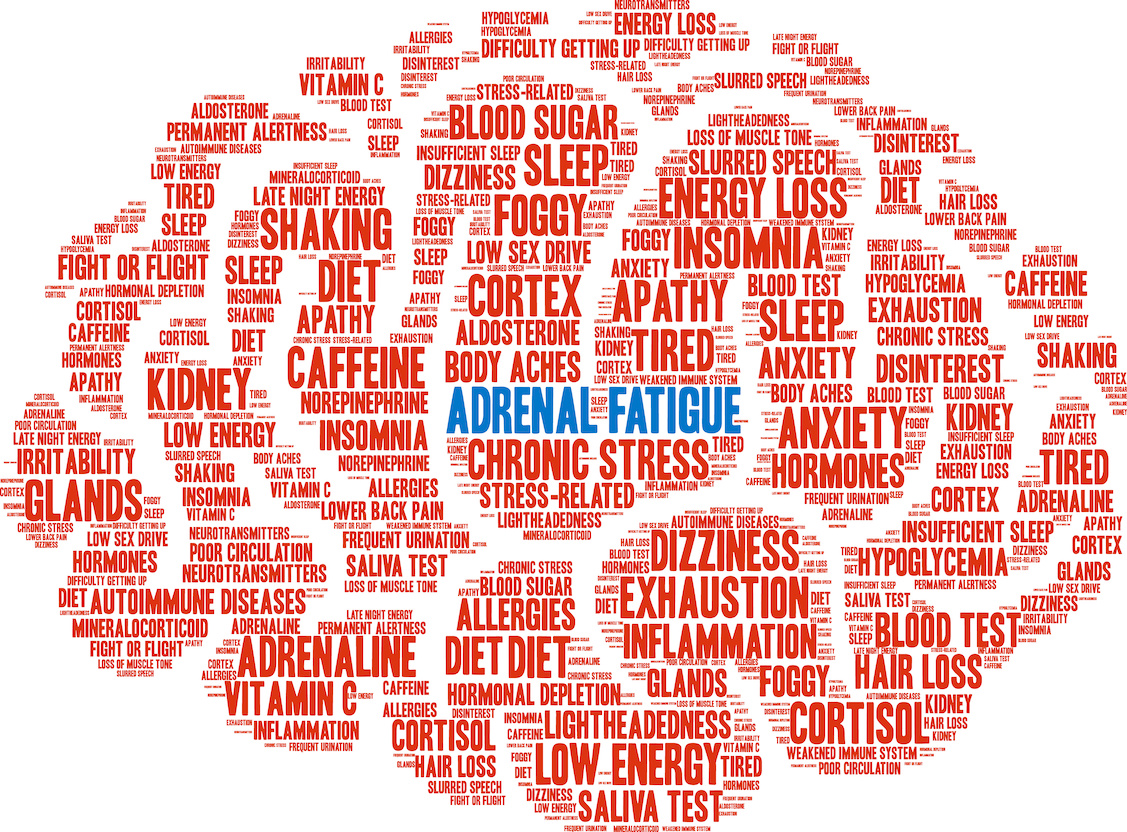Welcome to the Blog of
Dr. Matthew Lewis
Here, you’ll find news from our office, insights and observations from trusted sources in health, information about innovations in the effort to take back your own good health, testimonials from our clients, resources and recommendations of note, and more. Read a post or two and comment on anything that strikes a chord.

HPA Axis Dysfunction is a Legitimate — and Accurate Medical Diagnosis
I recently read an article on adrenal fatigue posted on a leading medical organization’s website that began with the claim that, “Adrenal fatigue isn’t an acceptable medical diagnosis.” This same article ended by stating, “. . . accepting a medically unrecognized diagnosis from an unqualified practitioner may leave the real cause — such as depression or fibromyalgia — undiagnosed, while it continues to take its toll.”
To be fair, the author is an M.D. and Ph.D. who studies the relationship between osteoporosis and cardiovascular disease and the potential role of estrogen in the development of both diseases. And the conventional medical community also recognizes adrenal insufficiency as a medically recognized diagnosis.
But to imply that adrenal fatigue is any less legitimate a diagnosis, or that the illness is any less “medical” in nature is puzzling. Especially when the same author recognizes depression and fibromyalgia as actual medical diagnoses. Truth is, even the medical community has no lab test for either of them.
In fact, I would suggest the opposite; that depression and fibromyalgia are not acceptable medical diagnoses and that accepting either diagnosis without a much deeper examination often leaves the real cause — an underlying adrenal-related physical condition undiagnosed and untreated.
I often see patients who have been diagnosed with depression or fibromyalgia or chronic fatigue syndrome — all medically-recognized diagnoses — who continue to suffer even when receiving what the conventional medical community deems proper treatment. Many of these patients have been diagnosed based solely on a process of elimination. It’s almost as if the doctor had given up resolving the issue and reached for a prescription pad in frustration.
Adrenal-related illnesses, like many medical ailments, exist on a spectrum and often involve more than one gland or organ or system. They are complicated conditions that require careful examination and detailed testing to unravel the mystery, and they often address several interrelated dysfunctions. Adrenal illnesses cannot be treated effectively simply by taking medications that suppress symptoms or supplements promoted solely for supporting immune function.
In this post, I describe a variety of health conditions related to the adrenal gland, some that may be caused by dysfunction upstream of the adrenal. With a greater understanding of the adrenal gland and dysfunctions that impact its health and function, my hope is that anyone with symptoms of an adrenal disorder seek a medical diagnosis from a functional and integrative medical practice to get at the root of what’s going on.
Adrenal fatigue
It was back in 1998 that James L. Wilson, DC, ND, PhD of Tucson, Ariz., coined the term “adrenal fatigue” and used it to describe a condition in which the adrenal glands — overstimulated by chronic stress — burn out and shut down, causing a variety of symptoms, including:
Getting Tested for Mold Toxicity in Tampa
With the coronavirus and COVID-19 (the disease it causes) commandeering the news cycle right now, I’m thinking that some people are so singularly focused on this illness that they’re missing the big picture — the importance of optimal health and wellness.
If this pandemic has taught us anything, it is that people with other, comorbid conditions are at the greatest risk for experiencing the worst outcomes. So, it stands to reason that one of the best ways for you to lower your risk of experiencing severe illness from COVID-19 is to optimize your health. And a key step toward optimizing your health is to ensure that you’re not suffering from any conditions that negatively impact immune function, such as mold toxicity.
I focus on mold toxicity because it is so prevalent in the Tampa area where I see and treat so many patients who suffer from this condition and improve dramatically from treatment. Because mold toxicity can have such a dramatic effect on immune function at a time when you need your immune system functioning at its best. Immune system dysfunction increases your risk of experiencing severe illness from COVID-19 in two ways:
- A weak immune response makes you more susceptible to infection and the spread of the virus through your body.
- An overreactive immune system can release excessive cytokines and other inflammatory chemicals into your body, which can result in sepsis — a potentially fatal condition involving inflammation in multiple organ systems. Most of the people who die from COVID-19 die as a result of an over-the-top immune response to the virus.
Having your home and you tested and treated (if necessary) for toxic mold and a mold-related illness is an important step toward ensuring optimal immune function and addressing any underlying inflammation.
Recognizing the Symptoms of Mold Toxicity
Exposure to moldy and damp environments can cause a variety of health problems with a wide range of symptoms, including the following:
Preparing for Virtual Functional Medicine Appointments in Tampa
It took a health pandemic for people to appreciate the value of being healthy rather than just being “not sick” or being able to manage symptoms. In today’s world, underlying chronic diseases place all of us at a significantly higher risk for complications and death from COVID-19.
As a result, the medical community is beginning to see a growing interest among the general population in the detection, prevention, and treatment of chronic diseases. Among these are diabetes, cardiovascular disease, chronic obstructive pulmonary disease (COPD), autoimmunity and other immune system disorders, kidney disease, and metabolic disorders.
At the same time, advances in technology have made prevention, diagnosis, and management of these and other chronic diseases easier than ever, while reducing the risk of exposure to infectious diseases that may be inherent in physical office visits. Increasingly, patients are scheduling virtual doctor visits via Zoom and other video-conferencing apps, and I am loving these telemedicine consultations.
In this post, I highlight the benefits of telemedicine and provide some tips to optimize these virtual doctor consultations.
Telemedicine Benefits for Doctors and Patients
Today, most doctor appointments last 7-15 minutes at the most. Patients typically spend far more time driving to the office and sitting in the waiting room than they do with their doctors. A 15-minute visit (again, max) may be enough time to check in with your doctor, but it is woefully inadequate for dealing with any complex issues — especially chronic conditions. That is, unless you’re looking for a quick-fix prescription, which isn’t a solution at all. It’s usually just a band-aid.
For doctors and patients committed to tracking down the root cause of health conditions, a consultative approach that provides you with ample time to speak — and be heard — is essential. Telemedicine, it turns out, may provide the additional time and focus to optimize the effectiveness of doctor visits.
As my experience with telemedicine has grown, I have become increasingly aware of its benefits, which include the following:
What’s Making Your Immune System Go Haywire?
As a doctor trained in the functional medicine approach to healthcare, I spend much of my time discovering and treating chronic illnesses, including those encompassing chronic inflammation, which can often be traced to immune system dysfunction. The COVID-19 pandemic demonstrates daily how an infection can trigger a powerful immune response resulting in inflammation.
With COVID-19, the inflammation primarily impacts the lungs, but it can affect other organs and tissues, as well. Deaths from COVID-19 are typically a result of excessive inflammation caused by the body’s over-the-top immune response.
Inflammation isn’t all bad. In fact, it’s part of the mechanism responsible for enabling the body to fight disease, recover from injury, and repair damaged tissue. Any trauma to the body’s cells triggers an inflammatory response. The immune system releases inflammatory chemicals, which expand blood vessels and cause them to leak, thereby delivering healing cells and substances to the site that’s injured or under attack. The expansion and leaking of blood vessels are what cause the inflammation.
Unfortunately, the immune system can become the body’s own worst enemy, identifying healthy cells as threats and attacking those cells — a condition referred to as autoimmunity. Various autoimmune diseases can develop as a result, depending on the cause and the organs or tissues being damaged. With type 1 diabetes, the immune system attacks pancreatic cells, impairing the body’s ability to produce insulin; with Hashimoto’s thyroiditis, the immune system attacks the thyroid; with rheumatoid arthritis, it primarily attacks the joints; with multiple sclerosis (MS) and Guillain-Barré syndrome, it attacks nerve cells; with myocarditis, it attacks the heart; and so on.
The exact mechanism that gives rise to an autoimmune disease remains a mystery. However, evidence suggests that the cause may be traced to a genetic susceptibility triggered by one or more environmental factors, which may include chronic stress, poor diet, gut dysbiosis (an imbalance of microorganisms in the intestines), infections, environmental toxins, as well as other stressors.
Recent research points to viral and bacterial infections as being major triggers for several autoimmune diseases, including the following:
Hashimoto’s Thyroiditis – Yes, but what’s the cause?
Low thyroid causes weight gain, hair loss and can be helped with holistic medicine.
Assessing Your Home For Root Causes of Chronic Fatigue & Inflammation
If you have been sick and have eluded your doctor's best attempts, check your air quality. Dr. Lewis describes how your home can be at the root cause of your illness.
Chronic Fatigue Syndrome – Healing Your Frustrations!
Too many people suffer with Chronic Fatigue without having any real answers or solutions. The problem is complex but the answers are sometimes coming from the air we breathe.
Five Gastroenterologists And Not One Stool Test
Chronic digestive problems can linger for years. Stool testing can help to find answers and reduce pain and symptoms. The GI Map stool test provides a comprehensive look at the digestive system.
The Hippo In Your Brain – Are you literally losing your mind?
If your are not sleeping welll or losing memory conventional medicine often falls short of finding causes or solutions. Learn about how cortisol can impact your brain by causing degeneration and what you can do to prevent this.
Mold, It’s Usually NOT Allergy – It’s A Biotoxin Illness Named CIRS
It’s been a few months since I have updated my blog. So, where was I?
It’s been a challenge to write while balancing my Tampa Functional Medicine practice, family life, and studying. I figured all that out, sort of! I am happy to be back to writing!
The purpose of my blog is to educate health care consumers on a range of health care topics, and most importantly help you to find the root cause of your health concerns. Since starting my blog, I am happy to say there are many patients who have reached out for more information in a one on one setting.
Besides that, what has really left me busy in the last few months….I have been in the “hole” reading through a borage of papers and books concerning CIRS-Chronic Inflammatory Response Syndrome. Over the last four years I have been engaged in testing patients for CIRS- mostly due to mold (more accurately, exposures to biotoxins in water damaged buildings) and Lyme biotoxin. I decided to take the plunge to learn the Shoemaker Protocol for CIRS- biotoxin illness through Dr. Ritchie Shoemaker and I am currently in the certification process.
In January 2019, I attended the









Recent Comments